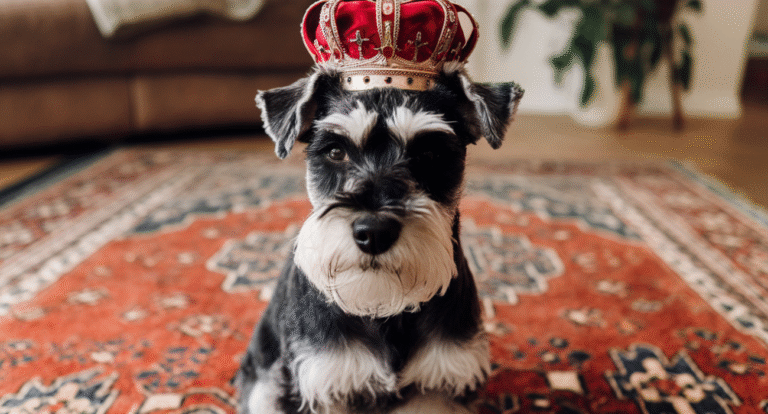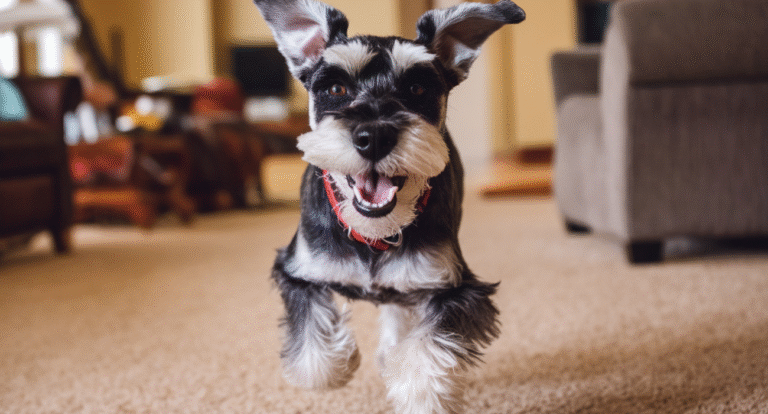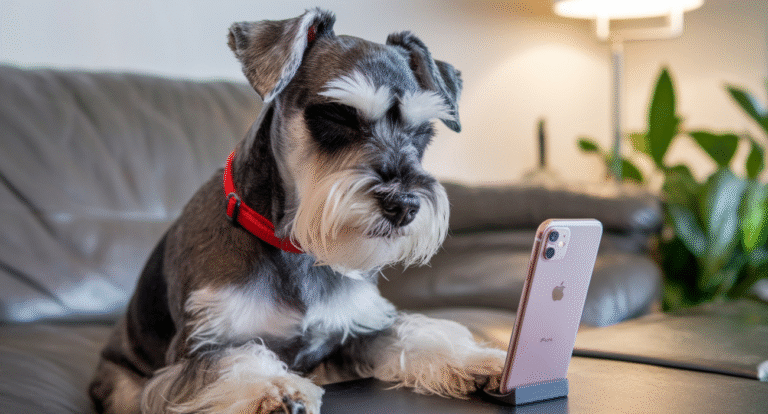Want your schnauzer to thrive, not just survive? These simple strategies will give them a happier, healthier life.
Miniature Schnauzers may be small in size, but they are packed with energy, personality, and charm. With their signature beards and spirited attitude, they can win over anyone’s heart. As much as they love life, their health depends on how well their humans take care of them. The good news is that keeping your Schnauzer healthy does not have to be complicated. By making a few smart choices and creating good habits, you can help your furry friend enjoy a long, vibrant, and tail-wagging life.
Think of this as your comprehensive playbook for raising a Schnauzer superstar. These seven strategies will transform you from a worried dog parent into a confident canine health guru, ensuring your four-legged friend stays happy, healthy, and ready to take on the world (or at least the neighborhood squirrels).
1. Serve a Schnauzer-Friendly Diet
Here’s where things get serious: Miniature Schnauzers are the drama queens of the dog world when it comes to food. Their sensitive digestive systems can turn a simple dinner into a medical emergency if you’re not careful. These little guys are particularly prone to pancreatitis, a painful inflammation of the pancreas that can be triggered by high-fat foods.
The golden rule? Low fat, high quality, all the way. Look for dog foods that contain lean proteins like chicken, turkey, or fish, paired with easily digestible carbohydrates such as sweet potatoes or brown rice. Steer clear of foods loaded with fillers, by-products, and mystery ingredients that sound like they belong in a chemistry lab.
Remember: Your Schnauzer’s stomach is not a garbage disposal. Those puppy dog eyes may be irresistible, but that greasy pizza slice could land you both at the emergency vet at 2 AM.
And please, for the love of all that is holy, resist the urge to share your bacon cheeseburger. Your Schnauzer’s digestive system will not thank you, and neither will your wallet when the vet bills start rolling in.
2. Maintain a Healthy Weight
Let’s talk about the elephant in the room: Schnauzer chonkiness. These dogs have mastered the art of looking absolutely pitiful when begging for treats, and many owners fall for it hook, line, and sinker. But here’s the brutal truth: an overweight Schnauzer is not a happy Schnauzer.
Excess weight puts tremendous strain on their tiny joints and can lead to a cascade of health problems including diabetes, heart disease, and arthritis. The good news? Portion control and regular exercise can work miracles. Invest in a proper measuring cup for their food (eyeballing it doesn’t count), and stick to scheduled meal times rather than free-feeding.
| Weight Management Essentials | Why It Matters |
|---|---|
| Portion Control | Prevents overeating and maintains steady metabolism |
| Regular Weigh-ins | Catches weight gain early before it becomes a problem |
| High-Quality Treats | Provides rewards without empty calories |
| Consistent Exercise | Burns calories and builds muscle |
3. Prioritize Dental Care
If you think your morning breath is bad, wait until you experience Schnauzer morning mouth. Their compact jaws create the perfect storm for dental disaster: overcrowded teeth, plaque buildup, and bacteria parties that would make a frat house jealous.
Don’t underestimate the power of a good toothbrush. Daily brushing is the gold standard, but even three times a week can make a massive difference. Use dog-specific toothpaste (human toothpaste is toxic to dogs), and introduce the routine gradually so your pup doesn’t think you’re trying to torture them.
Professional dental cleanings might seem expensive, but they’re a fraction of the cost of treating advanced periodontal disease. Plus, your Schnauzer’s breath will thank you, and so will everyone within sniffing distance.
4. Keep Those Ears Clean
Those adorable floppy ears that make your Schnauzer look like a stuffed animal? They’re also prime real estate for bacteria and yeast infections. The warm, moist environment under those ear flaps creates a perfect breeding ground for trouble.
Weekly ear checks should become as routine as brushing your own teeth. Look for redness, unusual odors, or dark discharge. When cleaning, use a veterinarian-approved ear solution and cotton balls or gauze. Never, ever use cotton swabs inside the ear canal; you risk pushing debris deeper or damaging delicate structures.
Pro tip: If your Schnauzer’s ears smell like a funky cheese shop or look like they’re hosting a science experiment, it’s time for a vet visit. Ear infections are painful and can lead to hearing problems if left untreated.
5. Stay Active Every Day
Schnauzers were originally bred as working dogs, which means they have energy reserves that would make a marathon runner jealous. A bored Schnauzer is a destructive Schnauzer, and trust me, you don’t want to come home to find your favorite shoes have been “redesigned.”
Daily exercise isn’t optional; it’s essential. This doesn’t mean you need to train for a triathlon together, but your pup needs consistent physical and mental stimulation. Morning walks, afternoon play sessions, and evening puzzle games create a perfect trifecta of exhaustion.
Interactive toys, agility courses (even makeshift ones in your backyard), and hide-and-seek games tap into their natural intelligence and hunting instincts. A well-exercised Schnauzer is more likely to curl up contentedly on the couch rather than redecorate your living room with couch stuffing.
6. Grooming Is More Than Looks
That iconic Schnauzer look doesn’t happen by accident. Their double coat requires serious maintenance, and neglecting grooming duties can lead to skin problems that go far beyond aesthetics.
Regular brushing prevents matting, which can trap moisture and bacteria against the skin. Those cute little “Schnauzer bumps” (follicular dermatitis) are actually a common skin condition that proper grooming can help prevent. Professional grooming every 6-8 weeks keeps their coat healthy and their signature beard looking dapper.
Don’t forget about nail trimming! Overgrown nails can cause pain and affect their gait, leading to joint problems down the road. If the sound of nail clippers sends your Schnauzer into hiding, consider gradual desensitization training or professional help.
7. Schedule Routine Vet Visits
Here’s where the magic happens: preventive care. Annual wellness exams might seem unnecessary when your Schnauzer is bouncing around like a furry ping-pong ball, but these visits are your secret weapon against serious health issues.
Miniature Schnauzers are prone to specific conditions including eye problems, bladder stones, and thyroid imbalances. Early detection through routine screenings can mean the difference between simple treatment and major medical intervention.
Think of your veterinarian as your Schnauzer’s personal health coach. They’re not just there for emergencies; they’re your partner in keeping your pup healthy for the long haul.
Stay current on vaccinations, discuss parasite prevention, and don’t hesitate to ask questions. A good vet will appreciate an engaged pet parent who takes an active role in their dog’s healthcare.
Your Schnauzer’s Health Journey Starts Now
Raising a healthy Miniature Schnauzer isn’t about perfection; it’s about consistency and commitment. These seven strategies form the foundation of a wellness plan that can add years to your pup’s life and life to their years. Your bearded buddy depends on you to make the smart choices that keep them bouncing, playing, and stealing hearts wherever they go.
The investment you make in your Schnauzer’s health today pays dividends in countless tail wags, sloppy kisses, and years of unconditional love. After all, a healthy Schnauzer isn’t just a pet; they’re a four-legged family member who deserves nothing less than your very best effort.






